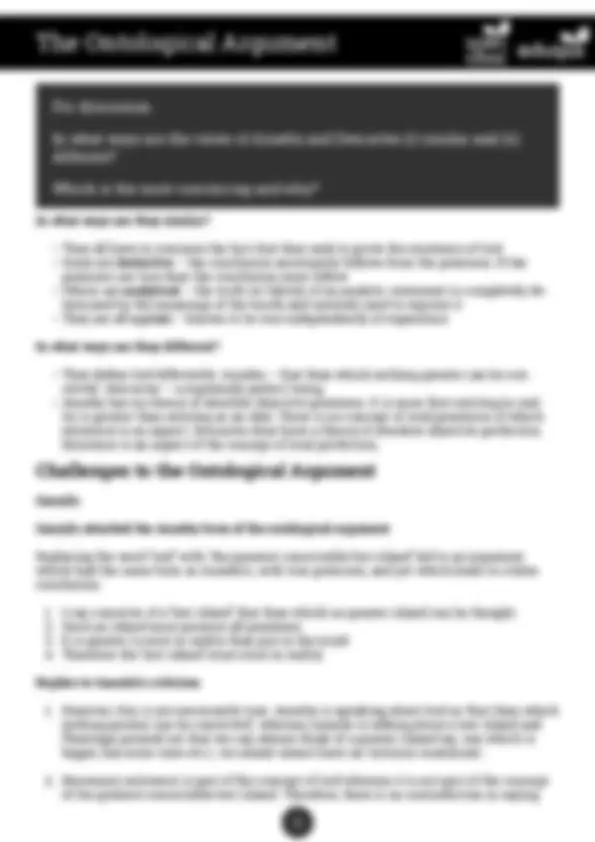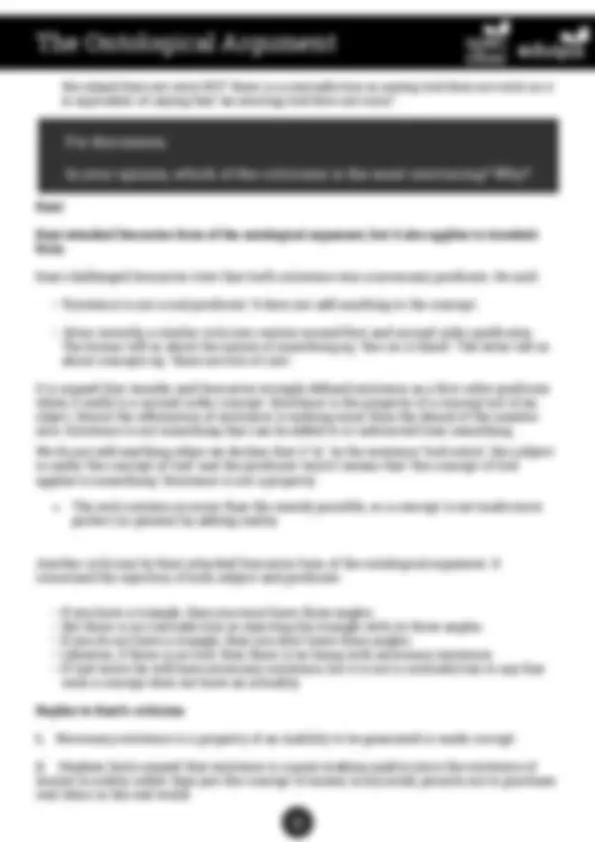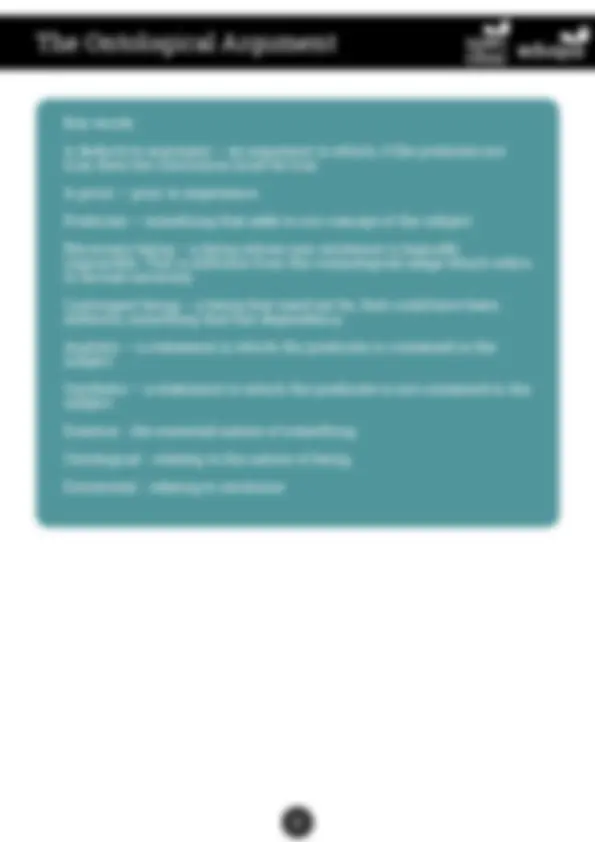





Study with the several resources on Docsity

Earn points by helping other students or get them with a premium plan


Prepare for your exams
Study with the several resources on Docsity

Earn points to download
Earn points by helping other students or get them with a premium plan
Community
Ask the community for help and clear up your study doubts
Discover the best universities in your country according to Docsity users
Free resources
Download our free guides on studying techniques, anxiety management strategies, and thesis advice from Docsity tutors
The Ontological Argument is an a priori philosophical argument used to prove the existence of God. It was first introduced by St. Anselm and later developed by René Descartes and Norman Malcolm. The argument defines God as 'that than which nothing greater can be conceived' and seeks to prove that God must exist in reality, not just in the mind. Anselm and Descartes both used different forms of the argument, and it has faced various criticisms throughout history. In this document, we explore the similarities and differences between Anselm and Descartes' views, the strengths and weaknesses of their arguments, and the challenges posed by philosophers like Gaunilo and Kant.
What you will learn
Typology: Study notes
1 / 7

This page cannot be seen from the preview
Don't miss anything!




St. Anselm
(i) First Form – a formal deductive argument:
Premise 1 God is the greatest possible being (nothing greater can be conceived) Premise 2 If God exists in the mind alone (only as an idea), then a greater being can be imagined to exist both in the mind and in reality Premise 3 This being would then be greater than God Premise 4 Thus God cannot exist only as an idea in the mind Conclusion Therefore, God exists both in the mind (as an idea) and in reality.
(ii) Second Form:
Descartes
Descartes distinguished between a thing’s essence and its existence. He argued it was pos- sible to determine what the essential nature of something was (its essence) independently of knowing whether it existed. He used the illustration of a triangle whose essence was three angles that added up to 180 degrees. The idea of the triangle could not be separated from the idea of the three angles. However that does not demand that triangles actually exist.
However, as Descartes could conceive of his own existence, he could also conceive of the existence of a perfect being. When he considered the idea of a supremely perfect being, he argued that existence was an aspect of perfection. In other words, the idea of a supremely perfect being was the unique case where existence was part of its essence, and therefore demanded that such a being existed.
Norman Malcolm
Norman Malcolm (1911-1990) developed Anselm’s second form. He rejected Anselm’s first form since it implied that existence was a property and Malcolm did not think existence was a property (similar view to Kant). However, the second form involved necessary existence and Malcolm did regard this as a property and so not open to Kant’s criticisms.
Malcolm avoids the language of greatness that Anselm used, and instead defines God as “an unlimited being”. One characteristic of an unlimited being would be necessary existence since an unlimited being cannot be dependent on anything – either for coming into existence or ceasing to exist.
Hence God’s existence is either impossible (since he could not be brought into existence by any- thing greater than himself) or God is necessary (since he cannot be brought into existence as he must always have existed). But God’s existence cannot be impossible since the only thing to make it impossible would be in the notion was logically contradictory, which it is not. Therefore God must be necessary and so must exist.
the island does not exist BUT there is a contradiction in saying God does not exist as it is equivalent of saying that ‘an existing God does not exist.’
Kant
Kant attacked Descartes form of the ontological argument, but it also applies to Anselm’s form.
Kant challenged Descartes view that God’s existence was a necessary predicate. He said:
It is argued that Anselm and Descartes wrongly defined existence as a first order predicate when it really is a second-order concept. Existence is the property of a concept not of an object. Hence the affirmation of existence is nothing more than the denial of the number zero. Existence is not something that can be added to or subtracted from something.
We do not add anything when we declare that it ‘is’. In the sentence ‘God exists’, the subject is really ‘the concept of God’ and the predicate ‘exists’ means that ‘the concept of God applies to something.’ Existence is not a property.
Another criticism by Kant attacked Descartes form of the ontological argument. It concerned the rejection of both subject and predicate:
Replies to Kant’s criticism
1. Necessary existence is a property of an inability to be generated or made corrupt 2. Stephen Davis argued that existence is a great making quality since the existence of money in reality rather than just the concept of money in my mind, permits me to purchase real items in the real world.
i. Inductive arguments can provide support for the conclusion whilst deductive argu- ments may provide absolute proof for conclusion. In an inductive argument, if all the premises are true then the conclusion could still be false. Whilst in a deductive argu- ment, if all the premises are true then the conclusion must also be true. ii. Anselm – that than which nothing greater can be conceived. Descartes – a supremely perfect being. iii. Anselm has no theory of absolute objective greatness. It is more that existing in real- ity is greater than existing as an idea. There is no concept of total greatness of which existence is an aspect. Descartes does have a theory of absolute objective perfection. Existence is an aspect of the concept of total perfection.
Existence is part of the concept of God. The predicate ‘exist’ does not contain any new infor- mation, since the predicate is contained in the subject. Therefore, it is an analytic proposi- tion that is about existence.
It is the only deductive argument, and only deductive arguments offer philosophical proof. Inductive arguments offer only probabilities.
i. Synthetic means that the predicate is not contained in the subject and contingent means there is no necessity. Therefore, God may or may not have existence. ii. If you think God exists is analytic then you probably think that either God is a special case of an analytic existential proposition or that there are examples of analytic exis- tential propositions. If you think it is synthetic then you probably think the ontological argument fails.
Check that in your answer: i. you have – identified both the strengths and the weaknesses; discussed their relative weightings; reached some conclusion; justified that conclusion by means of a reasoned argument
ii. you have NOT – rehearsed the ontological argument; listed in one paragraph the strengths and in another the weaknesses without any discussion of their relative weightings; given a conclusion which has not been clearly justified.